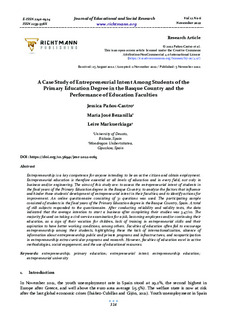Título
A Case Study of Entrepreneurial Intent Among Students of the Primary Education Degree in the Basque Country and the Performance of Education FacultiesAutor-a
Fecha de publicación
2022Otras instituciones
Universidad de DeustoVersión
Version publicadaTipo de documento
ArtículoArtículoIdioma
InglésDerechos
© 2022 The AuthorsAcceso
Acceso abiertoVersión de la editorial
https://doi.org/10.36941/jesr-2022-0165Publicado en
Journal of Educational and Social Research Vol. 12. N. 6. Pp. 314-329Editorial
RichtmannPalabras clave
Entrepreneurship
Primary Education
entrepreneurial intent
entrepreneurship education ... [+]
Primary Education
entrepreneurial intent
entrepreneurship education ... [+]
Entrepreneurship
Primary Education
entrepreneurial intent
entrepreneurship education
entrepreneurial university [-]
Primary Education
entrepreneurial intent
entrepreneurship education
entrepreneurial university [-]
Resumen
Entrepreneurship is a key competence for anyone intending to be an active citizen and obtain employment. Entrepreneurial education is therefore essential at all levels of education and in every field, ... [+]
Entrepreneurship is a key competence for anyone intending to be an active citizen and obtain employment. Entrepreneurial education is therefore essential at all levels of education and in every field, not only in business and/or engineering. The aims of this study are: to assess the entrepreneurial intent of students in the final years of the Primary Education degree in the Basque Country; to analyze the factors that influence and hinder these students’ development of entrepreneurial intent in their faculties; and to identify actions for improvement. An online questionnaire consisting of 31 questions was used. The participating sample consisted of students in the final years of the Primary Education degree in the Basque Country, Spain. A total of 168 subjects responded to the questionnaire. After conducting reliability and validity tests, the data indicated that the average intention to start a business after completing their studies was 3.47/10. The majority focused on taking a civil-service examination for a job, becoming employees and/or continuing their education, as a sign of their vocation for children, lack of training in entrepreneurial skills and their aspiration to have better working conditions, among others. Faculties of education often fail to encourage entrepreneurship among their students, highlighting these the lack of internationalization, absence of information about entrepreneurship public and private programs and infrastructures, and nonparticipation in entrepreneurship extra-curricular programs and research. However, faculties of education excel in active methodologies, social engagement, and the use of educational resources. [-]
Colecciones
- Artículos - Ingeniería [763]
El ítem tiene asociados los siguientes ficheros de licencia:






















